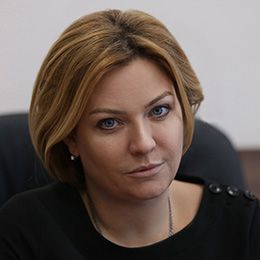Who Is Olga Lyubimova? Russia’s New Culture Minister May Not Like The Arts

KEY POINTS
- Lyubimova succeeds Vladimir Medinsky as culture minister.
- Lyubimova comes from a family of famous theatre professionals
- Lyubimova is one of only three women in the new cabinet
The new culture minister of Russia is a woman from a renowned family of theatre professionals, but apparently cares little for the arts.
Olga Lyubimova, 39, a member of the new regime under Prime Minister Mikhail Mishustin, has a background in film and TV production. On Tuesday she replaced Vladimir Medinsky as the culture minister.
Lyubimova is the fourth woman to serve as culture minister going back to the Soviet Union era, and is now one of only three women in the new government.
Lyubimova is the daughter of Boris Lyubimov, acting president of the Mikhail Shchepkin Higher Theater School, and the great-granddaughter of Vasily Kachalov, a famous Russian actor from the early 20th century.
However, in a 2008 blog, she wrote: "I simply can't stand going to exhibitions, museums, opera.” She even concluded: "I'm not bloody cultured at all.” Lyubimova also reportedly dislikes ballet and classical music.
In her blog she also stated: "I've been to Paris, but not to the Louvre. I haven't been on a gondola trip on the Venice canals. I've been to the British Museum, National Gallery and a few dozen more European and Russian museums and reckon I wasted my time there."
Lyubimova graduated with a degree in journalism from Moscow State University and was also in the theater studies department of the Russian Institute of Theater Arts. She became a TV correspondent in 2001. During her television career she produced documentaries about the Russian Orthodox Church.
From 2016 onward she produced programs for Channel One, Russia's state-owned TV channel.
She reportedly disliked attending a Russian Orthodox school. “The stress from three years of studying at an Orthodox gymnasium clearly testified that, in principle, I would never again be in the bosom of the Russian Orthodox Church,” she wrote. “By the seventh grade, the Orthodox gymnasium became [like] an Al Qaeda camp for me.”
However, she apparently changed her mind about the church when she met Patriarch Alexy II, the Patriarch of Moscow and the primate of the Russian Orthodox Church who died in 2008.
“I saw a lonely… wise old man who did not like to speak, who did not like publicity and vanity. And more than anything, he loved the divine liturgy. He loved to serve,” she said.
Prior to her elevation to the top job at the Culture Ministry, Lyubimova headed its cinematography department. She was hailed for eliminating corruption in state funding to the cinema industry.
However, she wrote about the cinema: "I can't watch the vast majority of documentary films. I don't understand a bloody thing about arthouse cinema.”
During her tenure at the ministry's cinematography department, the controversial British comedy “The Death of Stalin” was banned, while movie theaters were required to show more Russian films than foreign ones.
Ilya Shumanov, deputy director of the anti-corruption group Transparency International, mocked Lyubimova. "Clearly [they] could have appointed such a person to whatever job, just not to head Russia's cultural policy," he wrote.
But Russian film critic Anton Dolin commended her. "I've known Olga Lyubimova for quite some time. Today I'm sincerely glad that a young, smart, educated, pragmatic, contemporary woman who loves culture (well, at least the cinema) and is completely devoid of both fanaticism and cynicism, has become Russia’s culture minister.”
Galina Yuzefovich, a book critic, also praised Lyubimova. “You can think whatever you want, but based on my personal experience working with her, I think this is great news”
Vladimir Legoyda, a spokesman for the Moscow Patriarchate, also praised Lyubimova, calling her “very educated, striking, principled and simultaneously diplomatic and tough, with good artistic taste -- a rarity.”
Russian actor Stanislav Sadalsky also approved of Lyubimova’s appointment.
“This is the best gift that [Vladimir Putin] could give for us,” he wrote on his blog.
According to the Russian government, the Ministry of Culture is responsible for drafting and implementing national policy and the legal regulation of culture, the arts, historical and cultural heritage (including archaeological heritage), cinematography, archiving, tourism, copyright and associated rights. It is also authorized to manage state property and provide state services in culture and cinematography, to protect cultural heritage, copyright and associated rights, and to perform state oversight in this sphere.
© Copyright IBTimes 2025. All rights reserved.





















